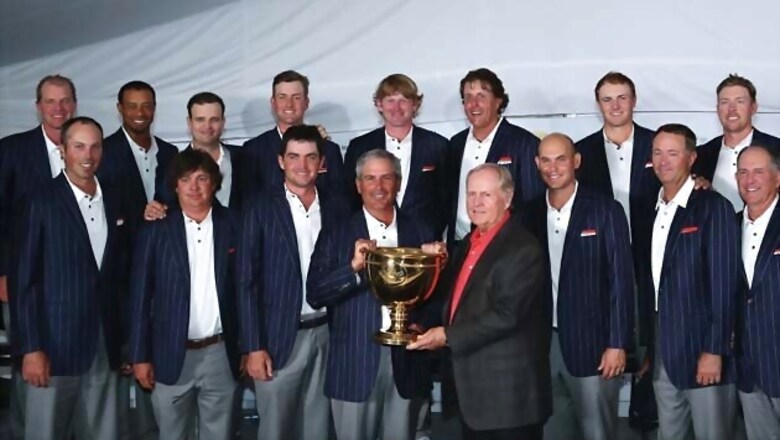
views
Dublin, Ohio: A marathon week of rain delays and birdie hunting at Muirfield Village Golf Club ended with yet another United States victory at the Presidents Cup, once again raising questions about the relevance of the biennial team competition.
The Internationals have triumphed only once and been beaten eight times in 10 editions since the Cup was launched in 1994, and many feel that a change to the event's points structure is sorely needed to make it more competitive.
Australian world number two Adam Scott has never been on a triumphant Internationals team despite playing in the Presidents Cup on six occasions, and expressed concern about the imbalance between the two sides on the eve of last week's edition.
"We need to make this thing really relevant, make it a real competition, because it's got a bit lopsided the last few outings," the Masters champion said. "I think we've got a team that can win, but the only way we can do it is by playing good and wanting it more than the Americans."
Despite mounting a gutsy fightback in Sunday's concluding singles session which they dominated, the Internationals faced an uphill task in their bid to beat a potent U.S. team and ultimately lost by 18-1/2 points to 15-1/2.
While the 12-man American lineup at Muirfield Village bristled with six players ranked in the world's top 10, the Internationals had eight players from outside the top 25.
"Absolutely," Internationals captain Nick Price said when asked if the depth in strength on the U.S. team had been the most significant factor. "That's pretty apparent."
Price firmly believes that the Presidents Cup should adopt the more compact Ryder Cup format to ensure the event's survival and to create closer competition, though his suggestion has been turned down by PGA Tour commissioner Tim Finchem.
In Price's opinion, fewer points give the stronger team less of an advantage as the weakest players do not compete as often, and he believes this would help the Internationals improve their dismal record against the United States.
"In order for the Presidents Cup to really go to the next level, it's got to become more consistently competitive," Zimbabwean Price said. "That is what's lacking.
"Until such time as that happens, I don't want to say it's going to flounder but it's not going to get to the next level. And everything needs to get to the next level to survive."
Though several Internationals players punched above their weight last week, especially Cup rookies Graham DeLaet of Canada, Zimbabwe's Brendon de Jonge and Australian Marc Leishman, they were heavily outgunned by more experienced U.S. opponents.
The weather delays did not help, forcing a backlog of matches and extended sessions, and fatigue was a noticeable factor for players who ended up competing in at least part of three different matches on the same day.
South Africans Charl Schwartzel and Louis Oosthuizen, who had been expected to flourish in partnership together as one of the top combinations for the Internationals, were among those affected.
"Of all the Presidents Cups I've been involved in, this was probably the hardest because of the weather conditions," said Price. "The hardest part was trying to figure out the pairings.
"I felt like I didn't have enough time to do the pairings. It just seemed like we were rushed a little bit. It's the same for (U.S. captain) Fred (Couples), so that's no excuse."
A popular aspect of the Presidents Cup is the fact that opposing captains can create intriguing matchups in the singles, very often when the players themselves have expressed a desire to take on a particular opponent.
Many had hoped to see world number one Tiger Woods compete against second-ranked Scott on Sunday but instead the American ended up playing against South African Richard Sterne, ranked 41st.
Price defended his strategy in deciding the order of his players.
"I did my pairings to try and win the Cup, not to put one or two together or three or five or whatever," he said. "The whole idea ... was to put what we felt was the best strategy forward to win this Cup.
"I wanted to put all the guys who are playing the best out first, who had played the strongest this week, to get some momentum for the guys at the back end."
To a great extent, Price's strategy worked as his players won 7-1/2 points out of the 12 available in the final session of the 2013 Presidents Cup.
While last week's showdown at a sodden Muirfield Village will mainly be remembered for the unseasonably heavy rain and the frustrating weather delays, it also showcased brilliant golf with an abundance of birdies being recorded on a layout which encouraged attacking play.
"If you have to count the number of birdies that was made in this Presidents Cup compared to other ones, I feel this one had a lot more birdies in it," said South African Ernie Els, a veteran of eight Cups. "The level of play was outstanding."
Asked to pinpoint the biggest difference between the two teams at Muirfield Village, Els replied: "We've got a strong team, I just thought the American team played exceptionally well, really.
"They made a lot of birdies, it seemed like they got momentum in most of the sessions, and we were trying to fight ourselves back into it.
"Maybe it's a lack of experience, but we just let some matches go here and there, maybe a tee shot here and there or a putt. The Americans putted a little bit better than us. But we weren't far away."
















Comments
0 comment